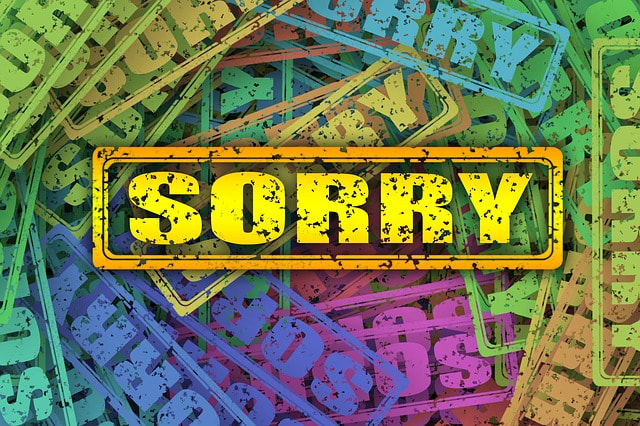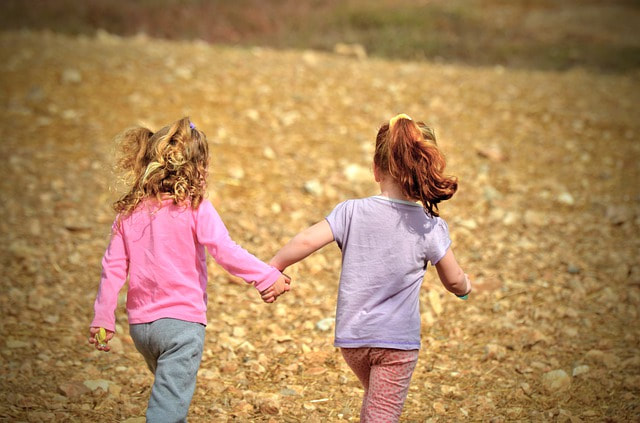We have trouble with this dynamic. Is it because we weren't really taught about the delicate process of sincerely apologizing? Are we narcissistic and our egos won't let us take responsibility for mistakes?
Apologizing in a meaningful and authentic way is a delicate ballet and we need to start learning the dance when we're young.
First, 2/3 of all relationships go downhill after the first baby is born. Are we too tired to care? Probably. Considering that you're both "new at this", parenting may expose hidden cracks in the relationship. Under the strain of new parenthood, many skirmishes may go without "repair". It's a dangerous road.
Since you'll be teaching your child to apologize, it's time to think about how you'll go about teaching this important lesson.
It's such an important part of maintaining respect and "connection" that it's critical for you, in your intimate relationships, to be aware of when and how to apologize. Apologizing isn't just for kids...anymore.
You may not have and you really don't need the perfect answer, all you need to show is that you care. If you don't make some attempt to connect, resentment will build up and now, you've got more problems than you started with.
If you find yourself in a series of skirmishes, sit down with yourself and give careful thought to "what" is going on and "why" it might be happening. Don't expect ruptures in the relationship to get "fixed" without some examination.
Gifts can be tricky. If the aggrieved party feels that your offering is an attempt to "buy your way" out of a sticky wicket, the rupture will expand. The feeling of being "bought off" is not satisfying or genuine.
Your gifts have to come with assurances of behavioral change. And, you have to keep your agreement. Changing your behavior shows you mean business. It's said that "a mistake that is repeated is a decision".
Make it a point to rebuild his/her perception of you with a thousand little displays and reminders of respect and affection. These displays can take many forms, but you must pay attention to the things your partner values and enjoys. Pay Attention!!! A gift has no value if it has no meaning.
YOU are your kids first and most important teacher, so share your wisdom. Talk openly about your own struggles with apologizing. "I don't like to make mistakes, so saying 'I'm sorry' is hard. I get embarrassed when I have to apologize." Listen to your inner voice when you have to fix a problem that requires an apology. Use that "content" as a way to share the challenge.
It's important to practice humility and accept our imperfections and mistakes. This kind of practice can also reduce perfectionism.
"I got really mad and hit you in the head with the truck". It helps to identify the emotions and the event itself for all of those who are involved.
But, don't do this while everyone is wailing. People in an intense emotional state can't hear, must less process words.
You'll spend a LOT of time (gently) pulling them aside and having a private conversation, not jerking them by the arm and demanding, "SAY YOU'RE SORRY RIGHT NOW...!!!!" Doing it this way is more about managing your shame and reducing your anxiety than it is about teaching your child a valuable lesson. In this way, "Sorry" turns out to be a "get out of jail" card...an escape from a difficult situation. This perception of how apologies "work" is sure to get them in trouble later.
It's a short walk between developing empathy, understanding a situation and peoples' feelings to figuring out the way to repair it. Questions such as, "What kinds of feelings did Ben have when you threw the sand in his face?" will help to develop that "other person's" experience.
Kids under the age of 3 years need to be told when to apologize and given the words. This process of "pre-teaching" helps them to get a basic sense of how "fixing" their mistakes works.
Those ages 3 to 5 are beginning to understand social rules AND when they are violating them. That's the time to really start the "apology education".
Start teaching the "Golden Rule". It's an "easy-to-remember nugget". Consider putting up a large piece of paper with the Golden Rule on it so kids can recognize it as well as be a constant presence in your home.
At about the age of 5 to 6, kids begin to understand and display remorse. What happens if you've got a kid who does not demonstrate empathy or remorse. You'll have to add some steps.
You may want to help your child write a note or draw a picture. This process "concretizes" the process...it becomes visual and subsequently more visual and meaningful. It would be really helpful to put the process in sequential frames like a cartoon strip.
Tell them about--
- The response to "accidental bumps". This is where you say, "Oops, are you OK?" or "I sure didn't mean to crash into you like that" or "Oh no! I wasn't paying attention. I'm so sorry" or "I was so careless. Did I hurt you?"
- Ways of saying "I'm sorry" without using the "S" word..."I was disrespectful, please forgive me" or "I wish I hadn't done that, I was careless" or "I did not take your feelings into consideration" or "That was impulsive of me. I acted without thinking". When working with kids, obviously, the fewer words, the better.
You might want to consider posting some "apology options" up in your house so that kids will know how to make the relationship repairs effectively.
The side benefit of all of this? Your kid will be watching you and when you need to make a repair, you'll be reminded of how to get it done. It's great, just great.
Claudia
Join me on Facebook at Dr. Claudia McCulloch
At drclaudia.net, click on the "Ask Me" button and send me a question.








